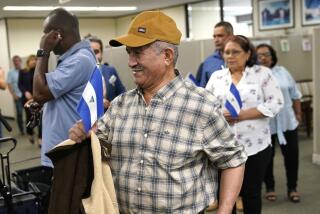Cuban Political Prisoner Freed After General Fled
- Share via
WASHINGTON — The defection of a Cuban general and his family to Key West last week added a new spin to U.S.-Cuban relations, long nearly non-existent, amid a bewildering flurry of brickbats and olive branches.
Although Fidel Castro’s regime is known to be enraged at the desertion of Brig. Gen. Rafael del Pino Diaz, a hero of the Bay of Pigs, it nevertheless released a well-known political prisoner Friday, the day after Del Pino’s flight.
Freed was Roberto Martin Perez Rodriguez, 54, believed by the Cuban-American Foundation here to have been in prison for 28 years, a record among the estimated 2,000 political prisoners still held by Castro.
Resisted Re-Education
“He was one of the first of the plantados, those who went naked rather than wear prison uniforms and refused to undergo political re-education,” said Frank Calzon, director of the foundation’s Washington office. Perez was flown to Panama after his release.
On Saturday, Del Pino was reported to be telling U.S. intelligence officers at a safe house near Washington that he left Cuba because he felt Castro was ruining his country. A fuller version of his remarks is expected to be broadcast to island listeners soon through Radio Marti, a special Voice of America transmission aimed at Castro’s countrymen.
U.S. officials, speaking on condition that they not be named, predicted that such a message from a high-ranking military officer will have a heavy impact on Cubans, who are already demoralized by a worsening economy and the drain of manpower required to maintain Cuban military forces in Nicaragua, Angola and other states in conflict.
Others May Still Be Freed
However, these same officials speculated that Castro may not let his anger at the news of the defection block the scheduled release this week of 60 political prisoners. The release has been pending since their processing was completed by U.S. immigration agents in Havana last December.
There was even some speculation that various U.S. pressures might lead the Cubans to resume immigration talks, which Castro broke off in 1985 when Radio Marti initiated its broadcasts.
The immigration talks dealt with Washington’s demand to return “undesirables” among the 125,000 Cubans who swarmed across the Florida strait in 1980 when Castro opened the port of Mariel. In return, the United States was willing to program the “orderly” immigration of small numbers of former Cuban political prisoners and their families, together with the relatives of Cubans living in the United States.
Eligible for Residence
Normal immigration halted at the end of the Mariel boatlift, although a trickle of political prisoners and adventurers willing to risk death at sea has continued to arrive in the United States. Like Del Pino, these defectors are eligible for residence in the United States and subsequent citizenship.
Officially, U.S.-Cuban contacts have virtually ceased.
Curtis Kamman, the most recent chief of the U.S. Interests Section in Havana, a small diplomatic mission that operates under the wing of the Swiss Embassy, was reassigned to Washington two months ago and has not been replaced.
Ramon Sanchez Parodi, head of the Cuban Interests Section in Washington, left Thursday for Havana only hours before Del Pino landed at Key West. So distant has been the relationship that State Department officials were unaware of Sanchez’s absence when news of Del Pino’s defection broke.
Informal Contacts Continue
Informal contact has continued, however, despite the freeze. Kenneth Skoug, head of the State Department’s office of Cuban affairs, traveled to Havana last month.
More to Read
Sign up for Essential California
The most important California stories and recommendations in your inbox every morning.
You may occasionally receive promotional content from the Los Angeles Times.









